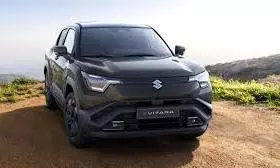
Maruti shifts focus to infrastructure development for EV success in India
text_fieldsMaruti Suzuki, India's largest car manufacturer, is making a significant leap into the electric vehicle (EV) market with its first-ever electric car, the e-Vitara.
Although the company has been slower than its competitors to introduce electric cars, it believes its strategy of prioritising infrastructure development will ultimately make EVs a mainstream choice for Indian consumers.
The e-Vitara, which will be launched in 2025, is a key milestone in Maruti’s transition to the EV market.
Designed specifically for electric power, the e-Vitara is built on the pure EV platform (eBorn SUV), a significant departure from other models in the market, which typically retrofit batteries onto internal combustion engine (ICE) platforms. This design ensures superior safety and performance, with a chassis that offers a long wheelbase of 2700mm, providing ample rear-seat space and comfort. The vehicle also features advanced safety features, including a fully encapsulated battery that has passed rigorous tests.
Maruti's Senior Executive Officer, Partho Banerjee, emphasises that the company’s first electric vehicle is not just about the car itself, but about creating an entire ecosystem that supports electric mobility.
The company’s "e For Me" campaign is central to this strategy, aiming to connect customers with an extensive network of charging stations and after-sales services. Maruti is working to expand EV charging infrastructure in the top 100 cities, where 97% of EV sales in India currently take place. Additionally, the company is launching mobile service units in 1,000 cities to assist customers on the go.
Despite the slow adoption of electric cars in India, Maruti is confident that focusing on the infrastructure first will help eliminate consumers' doubts.
Currently, many customers view electric vehicles as secondary options for short city trips due to concerns about range and charging infrastructure. However, Maruti’s strategy of building a strong ecosystem, including fast-charging stations and mobile service units, is designed to address these concerns and make electric cars a practical choice for daily use.
Looking ahead to 2030, Maruti plans to introduce five electric vehicles, with the e-Vitara being the first of many.
The company also aims to offer a variety of powertrain options, including ICE, electric, hybrid, and CNG vehicles, allowing customers to choose the best option for their needs.
Maruti’s approach is consistent with its history of focusing on infrastructure and customer confidence before the product itself. Banerjee notes that the company’s success in India has always been driven by a focus on after-sales services and creating a robust support system, and the same strategy will apply to the electric vehicle market.
Maruti's long-term goal is to contribute significantly to India's transition to electric mobility. By 2030, the company anticipates that EVs will account for approximately 1 million vehicles out of an industry total of 6 million.











